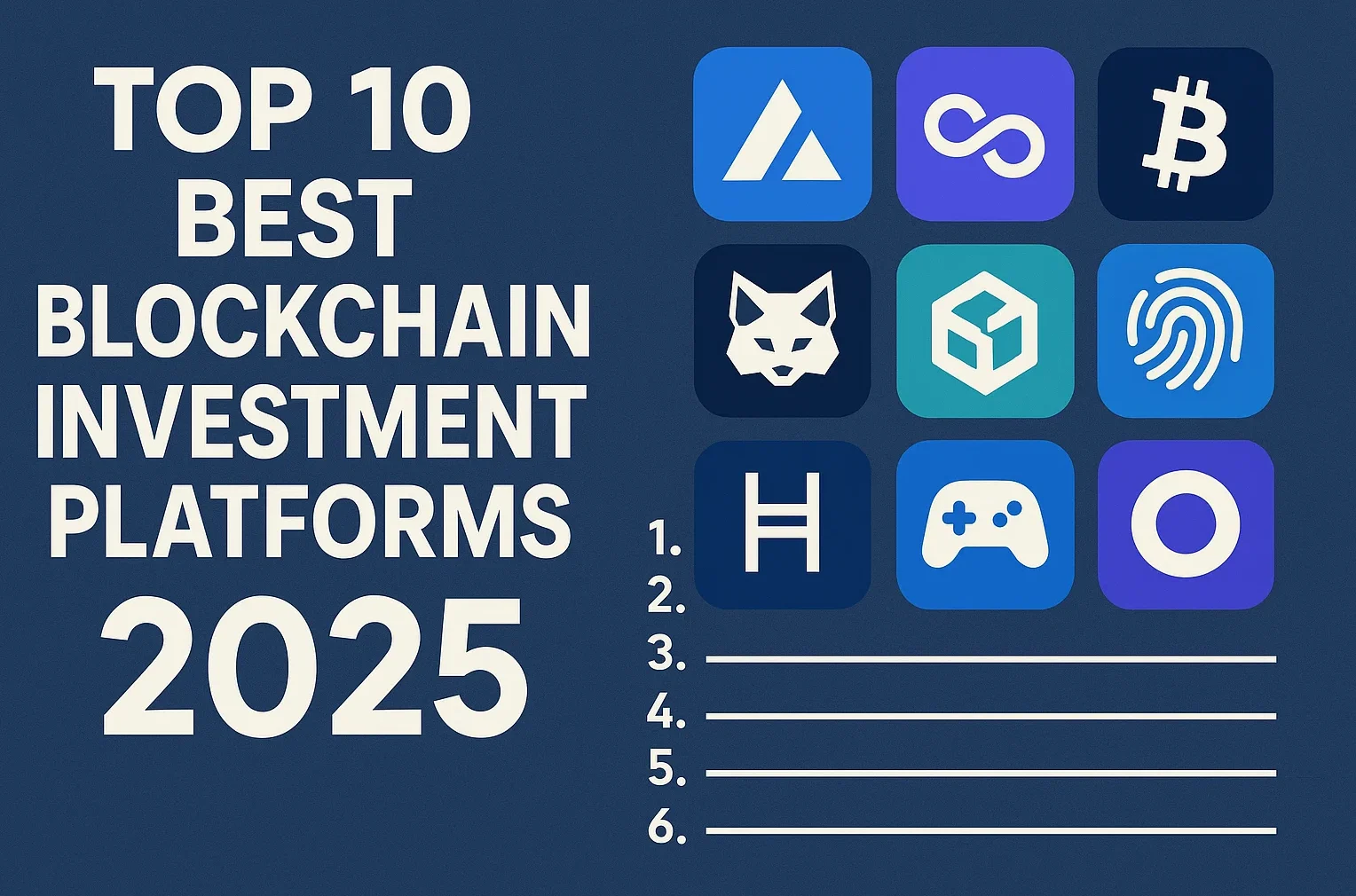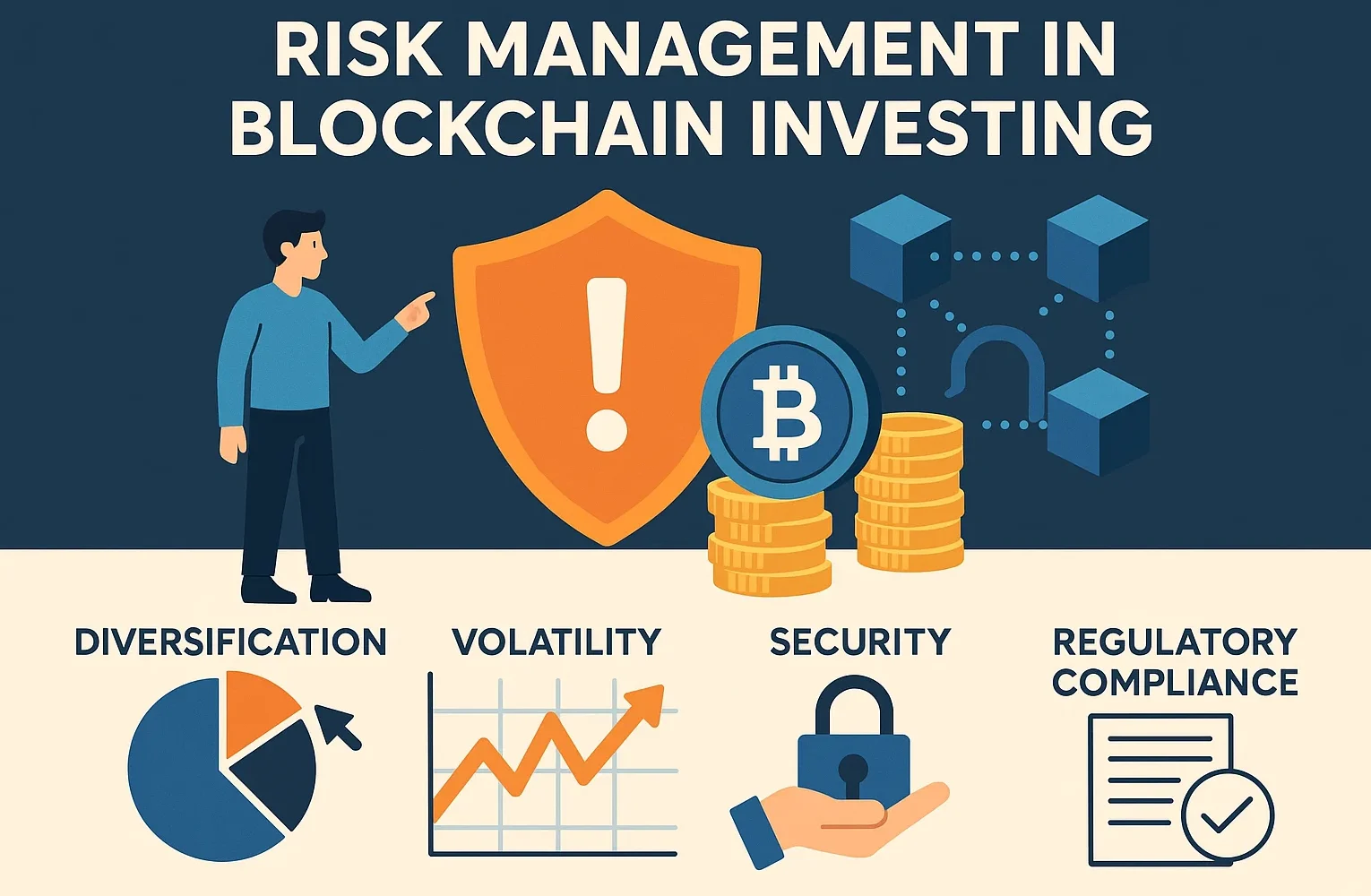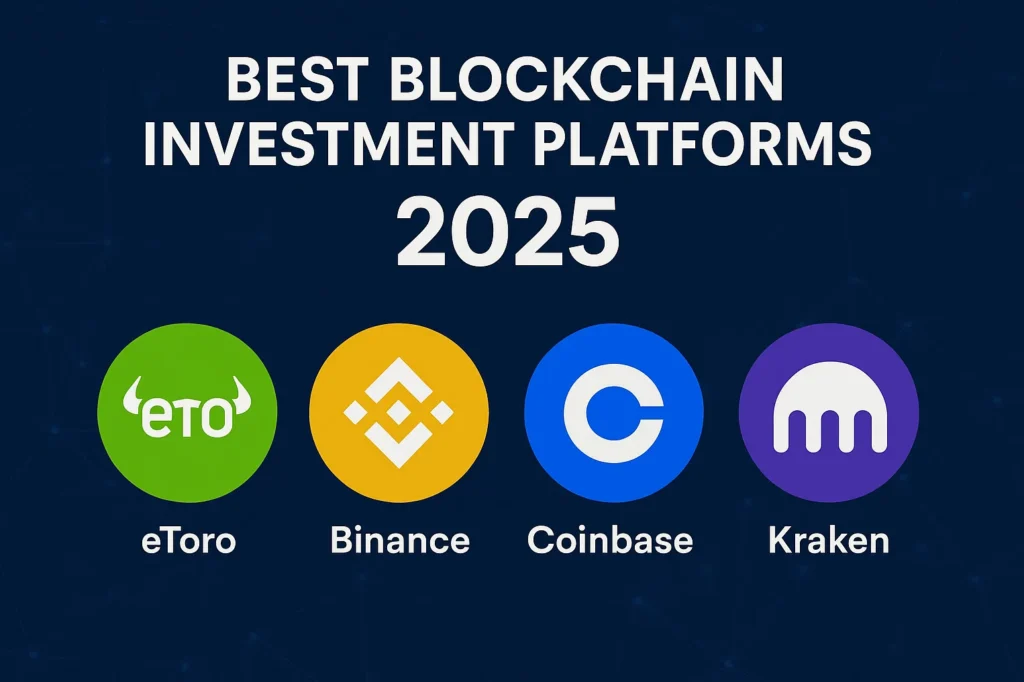The blockchain revolution has transformed how we think about investing, creating unprecedented opportunities in digital assets, cryptocurrencies, and decentralized finance. As we navigate through 2025, finding the best blockchain investment platforms 2025 has become crucial for both novice and experienced investors looking to capitalize on this technological breakthrough.
The blockchain investment landscape continues to evolve rapidly, with new platforms emerging while established ones enhance their offerings. Whether you’re interested in cryptocurrency trading, DeFi yield farming, blockchain stocks, or tokenized assets, selecting the right platform can make the difference between significant returns and costly mistakes. This comprehensive guide examines the top blockchain investment platforms available in 2025, helping you make informed decisions about where to invest your hard-earned money.
What Are Blockchain Investment Platforms
Blockchain investment platforms serve as digital gateways that enable investors to buy, sell, and manage various blockchain-based assets. These platforms have evolved far beyond simple cryptocurrency exchanges to become comprehensive investment ecosystems offering diverse opportunities in the blockchain space.
Modern blockchain investment platforms typically provide access to cryptocurrencies, tokenized securities, non-fungible tokens (NFTs), decentralized finance protocols, and even traditional stocks of blockchain companies. They combine the security and transparency of blockchain technology with user-friendly interfaces that make digital asset investing accessible to mainstream investors.
The distinction between traditional investment platforms and blockchain-focused ones lies in their native understanding of digital assets, advanced security protocols specifically designed for cryptocurrency storage, and integration with various blockchain networks. These platforms often feature built-in wallets, staking capabilities, and direct access to DeFi protocols that traditional brokerages simply cannot match.
Top 10 Best Blockchain Investment Platforms 2025

1. Coinbase Pro – Best Overall Platform
Coinbase Pro continues to dominate as one of the most trusted blockchain investment platforms globally. With its robust security infrastructure, regulatory compliance, and extensive asset selection, it remains the go-to choice for many institutional and retail investors.
The platform offers over 200 cryptocurrencies, advanced trading tools, and seamless integration with traditional banking systems. Coinbase Pro’s insurance coverage for digital assets stored on the platform provides additional peace of mind for large investors. The platform charges competitive fees ranging from 0.04% to 0.50% per trade, depending on your trading volume.
Key features include automatic tax reporting, advanced order types, and access to Coinbase’s institutional-grade custody solutions. The platform’s mobile app receives regular updates and maintains the same functionality as the desktop version.
2. Binance – Best for Cryptocurrency Variety
Binance stands out for offering the largest selection of cryptocurrencies and trading pairs in the industry. With over 350 digital assets available for trading, it provides unmatched diversity for blockchain investors seeking exposure to emerging tokens and established cryptocurrencies alike.
The platform’s fee structure is among the most competitive, with trading fees starting at just 0.1% and further reductions available through their BNB token. Binance also offers staking services, futures trading, and access to initial exchange offerings (IEOs), making it a comprehensive ecosystem for blockchain investment strategies.
Advanced features include margin trading with up to 10x leverage, automated trading bots, and a sophisticated API for algorithmic traders. The platform’s commitment to innovation is evident in its continuous rollout of new products and services.
3. Kraken – Best for Security and Compliance
Kraken has built its reputation on providing bank-level security while maintaining full regulatory compliance across multiple jurisdictions. The platform has never been successfully hacked, making it one of the most secure options among blockchain investment platforms.
Offering over 190 cryptocurrencies with competitive fees starting at 0.16%, Kraken provides a balance between security and functionality. The platform supports both spot and futures trading, along with staking services that allow investors to earn passive income on their holdings.
Kraken’s commitment to transparency includes publishing monthly proof-of-reserves reports, giving investors confidence in the platform’s financial stability and asset backing.
4. eToro – Best for Social Trading
eToro revolutionizes blockchain investing through its social trading features, allowing users to copy the trades of successful investors automatically. This makes it an excellent choice for beginners who want to learn from experienced blockchain traders.
The platform offers commission-free cryptocurrency trading and provides access to both individual cryptocurrencies and diversified crypto portfolios. eToro’s CopyPortfoios feature includes blockchain-themed investment strategies managed by their research team.
With over 75 cryptocurrencies available and integration with traditional stock trading, eToro serves as a bridge between conventional and blockchain investing. The platform is fully regulated and offers investor protection in multiple countries.
5. Gemini – Best for Institutional Investors
Gemini caters specifically to institutional investors and high-net-worth individuals seeking professional-grade blockchain investment solutions. Founded by the Winklevoss twins, the platform emphasizes regulatory compliance and institutional-level security.
The platform offers custody services, over-the-counter (OTC) trading desks, and white-label solutions for businesses. Gemini’s dollar-cost averaging feature helps investors build positions systematically, while their advanced order types suit professional trading strategies.
Gemini Earn allows investors to earn interest on their cryptocurrency holdings, with rates competitive among blockchain investment platforms. The platform’s focus on compliance makes it particularly attractive for institutional adoption.
Best Blockchain Investment Platforms 2025 for Different Investment Strategies
Platforms for Long-Term Holding
Long-term blockchain investors prioritize security, low fees, and reliable custody solutions. Platforms like Coinbase Pro and Gemini excel in this category, offering institutional-grade security with insurance coverage for stored assets.
These platforms provide features like automatic dollar-cost averaging, which helps investors build positions over time without timing the market. Cold storage options and multi-signature wallets ensure that long-term holdings remain secure even during extended holding periods.
Staking capabilities on these platforms allow long-term investors to earn passive income while holding their preferred blockchain assets. This is particularly valuable for proof-of-stake cryptocurrencies like Ethereum, Cardano, and Polkadot.
Platforms for Active Trading
Active traders require advanced charting tools, low latency execution, and sophisticated order types. Binance and Kraken lead this category with comprehensive trading interfaces and professional-grade features.
These platforms offer margin trading, futures contracts, and options trading for experienced traders looking to maximize their blockchain investment strategies. Advanced order types like stop-losses, take-profits, and trailing stops help manage risk in volatile markets.
API access enables algorithmic trading strategies, while mobile apps ensure traders can monitor and execute trades regardless of their location. Real-time market data and analysis tools support informed decision-making in fast-moving blockchain markets.
Platforms for DeFi Investing
Decentralized finance represents one of the most innovative aspects of blockchain investing. Platforms that integrate directly with DeFi protocols offer investors access to yield farming, liquidity mining, and decentralized lending opportunities.
Some blockchain investment platforms now provide direct access to popular DeFi protocols through their interfaces, eliminating the need for users to interact directly with complex smart contracts. This accessibility opens DeFi investing to a broader audience while maintaining the benefits of decentralized protocols.
Yield optimization strategies help investors maximize returns from their DeFi positions, while risk assessment tools provide insights into the potential risks associated with different protocols and strategies.
Key Features to Consider When Choosing Blockchain Investment Platforms
Security Infrastructure
Security remains the paramount concern when selecting blockchain investment platforms. Look for platforms that employ multi-signature wallets, cold storage for the majority of funds, and regular security audits by reputable firms.
Two-factor authentication (2FA) and biometric login options provide additional layers of protection for user accounts. Insurance coverage for digital assets offers peace of mind, though it’s important to understand the specific terms and limitations of such coverage.
Regular security updates and transparent communication about security practices indicate a platform’s commitment to protecting investor funds. Platforms with strong security track records and no history of successful hacks deserve preference.
Regulatory Compliance
Regulatory compliance varies significantly across blockchain investment platforms and jurisdictions. Platforms operating under proper regulatory oversight provide additional investor protections and are less likely to face sudden shutdowns or restrictions.
Know Your Customer (KYC) and Anti-Money Laundering (AML) procedures, while sometimes inconvenient, indicate a platform’s commitment to operating within legal frameworks. This compliance often provides access to traditional banking services and fiat currency on-ramps.
Regular audits and compliance reports demonstrate transparency and adherence to regulatory requirements. Platforms with clear regulatory status in your jurisdiction offer greater legal protection for your investments.
Fee Structures and Costs
Understanding fee structures is crucial for optimizing returns from blockchain investments. Trading fees, withdrawal fees, and deposit fees can significantly impact profitability, especially for active traders.
Many platforms offer tiered fee structures based on trading volume, providing incentives for larger traders. Some platforms also offer fee reductions for using their native tokens or maintaining minimum balances.
Hidden fees, such as spread markups on cryptocurrency purchases or network fees for withdrawals, should be clearly disclosed. Transparent fee structures allow investors to make informed decisions about platform selection.
Asset Selection and Availability
The range of available blockchain assets varies dramatically between platforms. While Bitcoin and Ethereum are universally available, access to newer or smaller cryptocurrencies may be limited to specific platforms.
Consider your investment strategy when evaluating asset selection. Conservative investors may prefer platforms with established cryptocurrencies, while those seeking higher growth potential might prioritize platforms offering emerging tokens and DeFi assets.
Geographic restrictions can limit access to certain assets or platforms entirely. Ensure that your chosen platform operates legally in your jurisdiction and provides access to your desired investments.
Blockchain Investment Strategies for 2025
Dollar-Cost Averaging Approach
Dollar-cost averaging remains one of the most effective strategies for blockchain investing, particularly in volatile markets. This approach involves making regular purchases regardless of price, which helps smooth out market volatility over time.
Many blockchain investment platforms now offer automated dollar-cost averaging features, allowing investors to set up recurring purchases without manual intervention. This strategy is particularly effective for long-term investors who believe in the fundamental value proposition of blockchain technology.
The key to successful dollar-cost averaging lies in consistency and patience. Market timing becomes less critical when spreading purchases over extended periods, reducing the impact of short-term price fluctuations on overall portfolio performance.
Portfolio Diversification
Diversification across different blockchain assets and investment types helps manage risk while maintaining exposure to the sector’s growth potential. This might include combining major cryptocurrencies, DeFi tokens, blockchain stocks, and emerging technologies.
Sector diversification within blockchain investing can include exposure to different use cases such as digital payments, smart contracts, decentralized storage, and gaming applications. Geographic diversification across different blockchain networks and development teams also reduces concentration risk.
Rebalancing strategies help maintain desired allocation percentages as different assets perform differently over time. Automated rebalancing features on some platforms simplify this process for investors.
Yield Generation Strategies
Blockchain technology enables various yield generation strategies not available in traditional investing. Staking rewards, liquidity provision, and lending protocols can provide steady income streams while maintaining exposure to asset price appreciation.
Staking involves holding proof-of-stake cryptocurrencies to support network operations in exchange for rewards. This strategy combines long-term holding with income generation, making it attractive for patient investors.
DeFi protocols offer more complex yield strategies, including liquidity mining and yield farming, which can provide higher returns but also carry additional risks. Understanding these risks is crucial before committing significant capital to yield generation strategies.
Risk Management in Blockchain Investing

Understanding Volatility
Blockchain assets are known for their extreme price volatility, which can create both opportunities and risks for investors. Understanding and preparing for this volatility is essential for successful blockchain investing.
Historical volatility patterns can provide insights into potential future price movements, though past performance doesn’t guarantee future results. Risk management tools like stop-losses and position sizing help limit potential losses during volatile periods.
Emotional discipline becomes crucial during high volatility periods. Having a clear investment plan and sticking to it regardless of short-term price movements helps avoid costly emotional decisions.
Platform Risk Assessment
Beyond market risks, blockchain investors face platform-specific risks including technical failures, regulatory changes, and security breaches. Diversifying across multiple platforms can help mitigate these risks.
Regular monitoring of platform news, security updates, and regulatory developments helps investors stay informed about potential risks. Maintaining some assets in personal wallets rather than keeping everything on exchanges provides additional security.
Insurance and compensation schemes vary between platforms, and understanding these protections helps inform platform selection decisions. Not all platform insurance covers all scenarios, so reading the fine print is essential.
Regulatory Risk Considerations
The regulatory landscape for blockchain investments continues evolving, with new rules and restrictions appearing regularly. Staying informed about regulatory developments in your jurisdiction is crucial for compliance and risk management.
Regulatory changes can significantly impact platform operations and asset availability. Platforms with strong compliance records and proactive regulatory engagement are better positioned to navigate changing requirements.
Tax implications of blockchain investing vary by jurisdiction and investment strategy. Consulting with tax professionals familiar with cryptocurrency regulations helps ensure compliance and optimal tax planning.
Future Trends in Blockchain Investment Platforms
Integration with Traditional Finance
The lines between traditional finance and blockchain investing continue to blur as established financial institutions launch blockchain investment services. This integration brings institutional expertise and regulatory clarity to the blockchain space.
Traditional brokerages are increasingly offering cryptocurrency trading alongside stocks and bonds, while blockchain-native platforms are adding traditional assets. This convergence provides investors with more comprehensive investment solutions.
Regulatory clarity improvements enable greater institutional participation, which should reduce volatility and increase market maturity. This institutional adoption validates blockchain technology as a legitimate asset class.
Advanced AI and Machine Learning Features
Artificial intelligence and machine learning are being integrated into blockchain investment platforms to provide better market analysis, risk assessment, and automated trading strategies. These technologies help investors make more informed decisions.
Predictive analytics and sentiment analysis tools provide insights into potential market movements, while automated portfolio optimization helps maintain desired risk profiles. These advanced features democratize access to sophisticated investment strategies.
Personalized investment recommendations based on individual risk tolerance and investment goals are becoming more common. These AI-driven insights help investors navigate the complex blockchain investment landscape more effectively.
Enhanced Security and Privacy Features
Security continues to evolve with new threats and technological advances. Blockchain investment platforms are implementing advanced security measures including zero-knowledge proofs, multi-party computation, and quantum-resistant encryption.
Privacy-preserving technologies allow investors to maintain confidentiality while meeting regulatory requirements. These innovations balance transparency needs with individual privacy preferences.
Decentralized identity solutions are being integrated to provide better user control over personal data while maintaining platform security and compliance requirements.
Conclusion
Selecting the best blockchain investment platforms 2025 requires careful consideration of your investment goals, risk tolerance, and preferred features. Whether you’re a beginner looking for educational resources and simplicity, or an experienced trader seeking advanced tools and extensive asset selection, the platforms reviewed in this guide offer compelling options for blockchain investing.
The blockchain investment landscape continues evolving rapidly, with traditional financial institutions entering the space while innovative platforms push technological boundaries. Security, regulatory compliance, and fee structures remain critical factors in platform selection, but the increasing sophistication of available tools and services makes 2025 an exciting time for blockchain investors.
LEARN MORE:Best Blockchain Investment Platforms 2025 Top 12 Secure Options for Investors


















